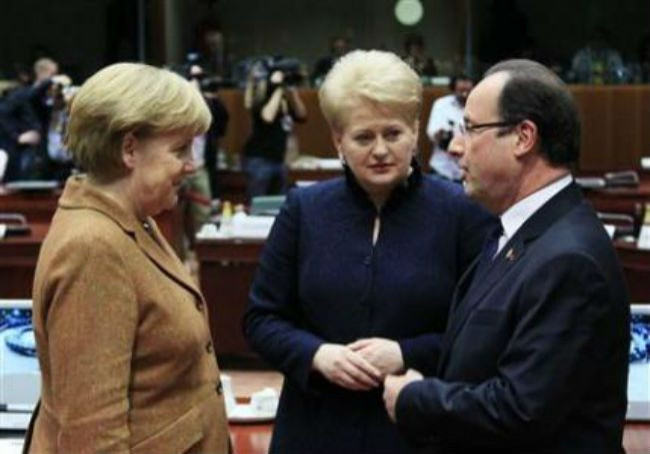
European Union negotiators are close to securing British and German backing for a deal on nearly a trillion euros of spending over the next seven years, but concessions will be needed to win support from France, Poland and some southern European states.
European Council President Herman Van Rompuy, who is chairing the summit of EU leaders, has to win over London and northern European states furious at a proposed hike in EU spending over 2014-2020 by making deep cuts to the plans.
But in doing so he may have fostered an alliance between France, angry at proposals to cut the farm subsidies it gets from the budget, and countris in east Europe, who receive budget funds to help develop their economies. Spain andItaly could also align with the French position in negotiations.
French President Francois Hollande said on arrival he would stand up for the Common Agricultural Policy, a long-standing farming subsidy program that gobbles up more than 40 percent of the EU budget and of which France is the biggest beneficiary.
The negotiations, which could go on for two or three days, promise to be hard fought and potentially acrimonious, particularly if France and Britain end up reigniting old animosity over spending.
Failure to strike a deal would add to the impression that EU leaders are unable to take decisive action when needed, after endless rounds of wrangling to resolve the euro zone's long-running debt crisis over the past three years. It would further damage the EU's image with its 500 million citizens.
Polish Prime Minister Donald Tusk said east European countries had teamed up with France and other net budget contributors keen to protect farm funds, including Italy and Spain, to force Van Rompuy to reverse some of his proposed cuts.
"The support of big, net contributing countries is key. Poland's position is difficult because we are net takers not net contributors, and the arguments of those who give money are usually stronger," he told reporters at the summit.
But Britain and Germany, along with Sweden and the Netherlands, are insisting on deeper budget reductions.
"The bottom line here is that we think we can find significant savings - tens of billions - compared to what is on the table," a British official told reporters. Sources said German Chancellor Angela Merkel was pushing for further cuts of about 30 billion euros.
EU officials said Van Rompuy may try to reconcile both views by reversing some of his cuts to farm and regional development funds, while taking an axe to spending on areas like EU staff salaries and money for cross-border transport and energy links.
Leaders were only expected to discuss the new compromise package over an austere dinner of cold cuts that was pushed back until midnight as bilateral consultations ran over schedule.
Merkel, whose country is the EU's biggest net contributor, said it might not be possible to reach a deal this week and another round of negotiations may be needed early next year.
TOXIC DEBATE
The depth of Europe's debt crisis has made the perennial arguments over farm subsidies and rebates all the more bitter, with negotiators now contemplating the first ever real terms decline in future EU spending.
Gone are any hopes poorer EU states may have had of an increase in funds to cement the bloc's eastward expansion over the last decade. Calls to refocus limited EU resources on new growth-oriented areas have been largely ignored as countries scramble to defend traditional spending areas.
The bulk of EU budget spending - around two-thirds of the annual 130-billion-euro outlay - goes on agriculture and funds to help poorer economies catch up with the rest.
The current budget framework was agreed in 2005 in the midst of a credit-fuelled economic boom, and set a maximum limit of 1.034 trillion euros on EU financial commitments for the period 2007-2013 - equivalent to about 1 percent of EU output.
The Commission initially demanded a roughly 5 percent increase in spending for 2014-2020, equal to 1.091 trillion euros. But this has already been reduced to 1.01 trillion euros under Van Rompuy's compromise, and is expected to dip below the trillion euro mark in the final reckoning.
One issue negotiators fear could derail the talks is toxic debate surrounding Britain's budget rebate, worth 3.5 billion euros last year. Margaret Thatcher won the annual refund in 1984 to reflect the lower share of farm subsidies received by Britain compared with France, Italy and others.
EU officials accept that Cameron cannot win the support of Britain's euro-sceptic parliament for any deal that scraps the rebate, and even a proposal to reduce its value may have to be abandoned to win Britain's backing at the summit, at the risk of further alienating other countries.
Cameron has threatened to veto a deal unless it is good for British taxpayers. But another veto, less than a year after he blocked a treaty change to allow stricter fiscal discipline in the euro zone, would further isolate Britain in Europe and could increase pressure for it to leave the EU.
"Many countries are asking themselves what the hell is happening with Britain? Is it on its way out? In which case, why should we make major concessions?" said one EU official at the summit, speaking on condition of anonymity.
© Thomson Reuters.




